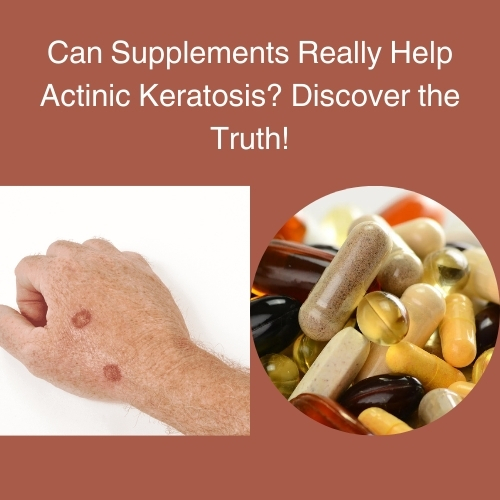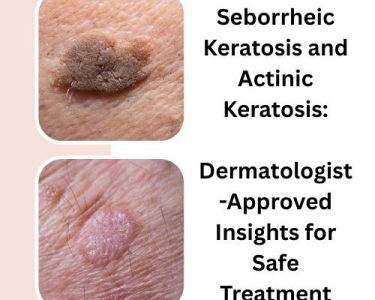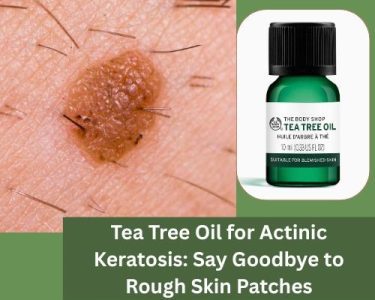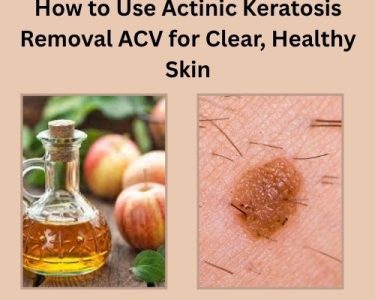Actinic Keratosis is a common skin condition that arises from prolonged exposure to ultraviolet (UV) radiation. It typically appears as rough, scaly patches on sun-exposed areas of the body such as the face, scalp, ears, and hands. Since actinic keratosis is considered precancerous, many people seek ways to prevent its progression—often turning to dietary and herbal supplements as part of their skin health regimen.
But can supplements really help treat or prevent actinic keratosis? In this article, we explore the truth about supplements, their role in skin health, and the potential of Buy Best Herbal Supplements Products and Natural Remedies as a supportive option.
What is Actinic Keratosis?
Actinic Keratosis (AK) is a rough, scaly patch on the skin that develops from years of exposure to the sun. It’s also known as solar keratosis or senile keratosis. These spots are considered precancerous, meaning they can sometimes develop into a type of skin cancer called squamous cell carcinoma if left untreated.
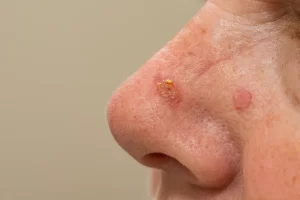
Key Facts:
- Cause: Long-term exposure to ultraviolet (UV) rays from the sun or tanning beds.
- Appearance: Small, dry, scaly or crusty patches; color can range from skin-toned to red or brown.
- Common Locations: Face, ears, neck, scalp, forearms, and hands — areas frequently exposed to sunlight.
- Who’s at Risk: Fair-skinned individuals, older adults, and people with a history of frequent sun exposure.
Symptoms:
- Rough or dry skin patches
- Itching or burning sensation
- Hard, wart-like surface
- Tenderness when touched
Treatment Options:
- Cryotherapy (freezing)
- Topical medications
- Photodynamic therapy
- Laser or chemical peels
Prevention:
- Regular use of sunscreen
- Wearing protective clothing
- Avoiding tanning beds
- Routine skin checks by a dermatologist
Related Articles: 11 Natural Treatments for Actinic Keratosis
How can Supplements Really Help Actinic Keratosis?
Supplements can play a supportive role in managing actinic keratosis (AK) by improving skin health, supporting the immune system, and potentially reducing the risk of progression to skin cancer. However, they should not replace medical treatments like cryotherapy or prescription creams. Instead, they may complement other therapies and help with prevention.
Key Supplements That May Help:
- Nicotinamide (Vitamin B3)
- Most studied supplement for AK.
- Shown in clinical trials to reduce the number of new actinic keratoses and non-melanoma skin cancers.
- Typical dosage: 500 mg twice daily (consult your doctor).
- It works by enhancing DNA repair and supporting immune function.
- Antioxidants (Vitamin C, Vitamin E, Selenium)
- Help protect skin cells from UV damage.
- May reduce oxidative stress, a contributor to AK.
- Found in supplements or antioxidant-rich foods like berries, nuts, and leafy greens.
- Omega-3 Fatty Acids
- Found in fish oil or flaxseed oil.
- Have anti-inflammatory properties that may help reduce skin irritation and inflammation.
- Some evidence suggests they might reduce risk of some skin cancers.
- Vitamin D
- Important for skin health and immune support.
- Low vitamin D levels are associated with increased cancer risk, including skin cancers.
- But balance is key — excessive sun exposure to raise vitamin D can worsen AK.
- Polyphenols (Green Tea Extract, Curcumin)
- Natural compounds with anti-inflammatory and anti-cancer properties.
- Topical green tea extracts have shown some benefit in treating AK.
- Oral forms can support overall skin and immune health.
Important Notes:
- Always consult a healthcare provider before starting any supplement, especially if you’re on medication or have health conditions.
- Supplements are not a cure but may be part of a broader prevention and wellness plan.
- Healthy lifestyle habits (sun protection, diet, regular skin exams) are still the most important part of AK management.
Key Supplements That May Support Skin with Actinic Keratosis
Here are some supplements and herbal compounds that are gaining attention for their skin-protective benefits:
1. Green Tea Extract (EGCG)
Epigallocatechin gallate (EGCG), the main polyphenol in green tea, has been shown to help protect skin cells from UV damage and reduce inflammation.
2. Curcumin (Turmeric)
Curcumin is a powerful anti-inflammatory agent that may help minimize abnormal skin cell growth associated with AK.
3. Milk Thistle (Silymarin)
This is a popular Herbal Supplement for Actinic Keratosis ecause of its antioxidant effects and potential to support liver detoxification and skin regeneration.
4. Vitamin D3
Adequate levels of vitamin D support the immune system and help regulate skin cell turnover, making it essential for skin health.
5. Omega-3 Fatty Acids
Found in fish oil and flaxseed, omega-3s reduce inflammation and may help the skin respond better to environmental stress.
6. Vitamin C and Vitamin E
These antioxidants help repair damaged skin, protect against free radicals, and improve the skin’s texture and resilience.
Related Articles: Actinic Keratosis Natural Treatment
Can Herbal Supplements Replace Medical Treatment?
No. While herbal and dietary supplements can support your skin health, they are not a substitute for professional medical treatments. Actinic keratosis has the potential to become cancerous, so it’s vital to have any suspicious skin lesions examined by a dermatologist.
However, combining traditional treatment with a supportive wellness routine—including Herbal Treatment for Actinic Keratosis, sun protection, and a skin-healthy diet—can be an effective strategy for overall skin care.
Additional Natural Prevention Tips
- Wear sunscreen daily (SPF 30 or higher)
- Avoid tanning beds and peak sun hours
- Eat antioxidant-rich foods such as berries, leafy greens, and tomatoes
- Stay hydrated and moisturize your skin regularly
- Conduct regular skin checks for any changes or new spots
Conclusion:
Yes—supplements can help support the body’s ability to manage Actinic Keratosis, but they are not a standalone cure. Nutrients and herbal extracts may improve skin resilience, reduce inflammation, and protect against further UV damage. For those seeking a natural approach, a well-formulated herbal supplement for actinic keratosis can be a helpful addition to conventional care.
Always consult your healthcare provider or dermatologist before starting any new supplement, especially if you are already undergoing treatment for actinic keratosis.

